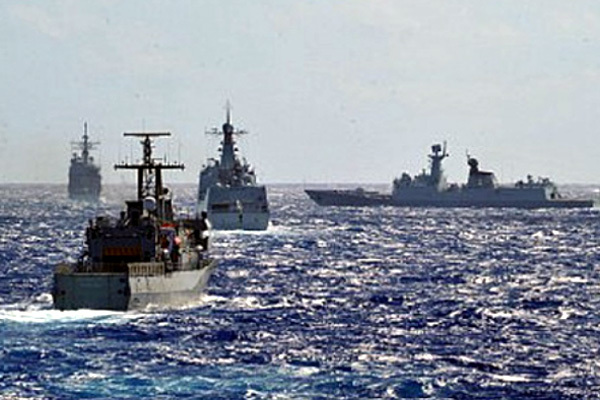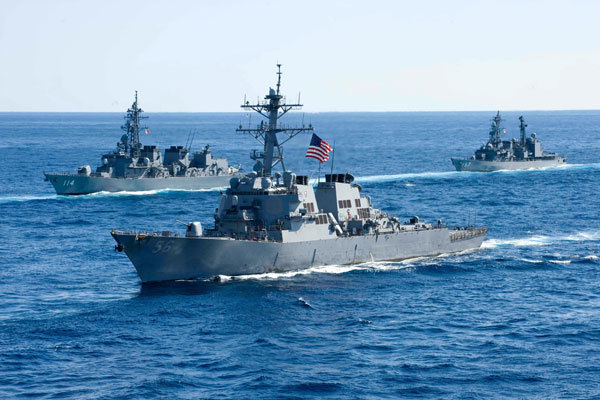The PCA’s ruling on the Philippines’ lawsuit against China holds a solid legal basis and high value in the settlement of disputes in the East Sea (internationally known as the South China Sea).
 |
|
The case between the Philippines and China is a lawsuit proceeding under Annex 7 of the UNCLOS. illustrative image. Photo: AP
|
On July 12, 2016, the PCA established under Annex 7 of the United Nations Convention on the Law of the Sea (UNCLOS) issued a historic ruling on the Philippines' request for an interpretation of a number of provisions of the Convention in relations with China.
The important contributions of the ruling are:
- Affirming the unity and universality of the UNCLOS in creating a legal framework governing the legal status of territories, islands, rocks, semi-submerged and floating features, the breadth of the seas and legal activities on the sea. The PCA affirmed that the maritime rights and obligations of countries are only governed by the provisions of UNCLOS, rejecting all claims contrary to the provisions of the UNCLOS.
- Explaining clearly the relationship between the legal status of the exclusive economic zone and historic rights. The provisions of the UNCLOS have superseded all historic rights with a connotation contrary to the provisions of the UNCLOS. On that basis, the PCA rejected China’s nine-dash line claim in the East Sea.
For the first time, an international tribunal explained in detail Article 121 regarding the legal status of islands and rocks. On that basis, the PCA clarified the disputes in Truong Sa (Spratly) Archipelago and Scarborough Islands. All the floating features in the Spratlys have only 12 nautical miles of territorial waters. All semi-submerged shoals in the Spratlys are not subject to occupation and have no maritime zones.
The PCA rejected any possibility of applying archipelagic baselines to island features in the Spratlys.
The PCA affirmed the obligations of countries in protecting the marine environment, criticized actions that destroy corals, and changed the nature of island features to build bases on the sea.
The PCA upheld the principle of freedom of the high seas and pointed out the possibility of high seas in the East Sea as well as the fishing rights of fishermen of the Philippines, Vietnam, China and other countries.
Revisiting the East Sea policy
The PCA’s ruling is the basis for countries to rethink their policies in the East Sea. After hesitating and being influenced by political - economic factors, Philippine Foreign Secretary Teodoro Locsin on June 8 said that the PCA’s ruling is the Great Bear star guiding us in the present, and also indicates the right path in the future.
According to Locsin, the ruling is final and the Philippines strongly opposes any attempt to debase the ruling, to erase it from law, history and collective memory. He added that the ruling has become and will continue to be the cornerstone of international law and it is valid for other countries with the same problematic island features as the Philippines.
By explaining that island features in the Spratlys do not have their own exclusive economic zone and continental shelf, the ruling has contributed to minimizing future delimitation disputes as well as the extent of overlapping maritime zones. The countries surrounding the East Sea have the right to preserve their exclusive economic zones and continental shelves determined from land in accordance with the UNCLOS and the principle of "Land dominates the sea".
The ruling is the reason for Malaysia’s submission dated December 12, 2019 to the United Nations Commission on the Limits of the Continental Shelf (CLCS) for an extended continental shelf (ECS) beyond 200 nautical miles from the baselines from which the breadth of the territorial sea is measured to the north. This expansion is legal as long as it does not create overlapping areas with the extended continental shelf from Vietnam or the Philippines.
The ruling is the basis for promoting countries inside and outside the region to more clearly express their stance on issues in the East Sea. The “war of diplomatic note exchange” occurred in 2020-2021 with 25 notes, two diplomatic letters and one declaration (1 statement by Brunei, 9 notes and 1 letter from China, 3 notes from Malaysia, 3 notes from Philippines, 3 notes from Vietnam, 2 notes from Indonesia, 1 note from Australia, France, UK, Germany, Japan, and 1 diplomatic letter from the US).
Except for China, the contents of these documents are:
- Calling for recognition of the unity and universality of UNCLOS in providing the necessary legal framework for all activities at sea and oceans to be followed. UNCLOS is the legal basis for settling maritime disputes.
- The PCA’s ruling on 12/6/2016 is final and binding on the parties to the disputes, the Philippines and China.
- The island features in the Spratlys have a territorial water of only 12 nautical miles.
- Freedom of navigation and overflight in the East Sea should be respected.
- The archipelagic baseline method is applicable only to archipelagic States and they cannot be unlawfully applied to the offshore islands of the coastal state.
- Land reclamation activities and all other forms of man-made transformation do not change the legal status and classification of island features at sea according to the UNCLOS.
- Claims related to the exercise of “historic rights” in the East Sea are inconsistent with international law and the UNCLOS.
Foundation for unity
 |
|
The US stated its support for the PCA’s ruling. Photo: AP
|
The PCA’s ruling affects ASEAN's position in asserting its centrality. The Statement of the 36th and 37th ASEAN Summits in 2020 clearly outlines the universality and unity of the UNCLOS in defining maritime titles, sovereign rights, jurisdiction and legitimate interests of the coastal states.
All activities at sea should be carried out in accordance with the legal framework provided by the UNCLOS. The ruling can become the foundation for ASEAN's unity in promoting the settlement of the East Sea issues.
The US State Department’s statements also represent consistent policy from the Trump administration to the Biden administration in support of the ruling. The press statement of the US State Department dated February 19, 2021 said:
The US position is similar to the conclusions of the PCA’s ruling 2016 on China's unwarranted claims in areas within the exclusive economic zone or continental shelf of the Philippines.
The US opposes any claim to waters beyond the 12-nautical-mile territorial waters of the claimed islands in the Spratlys.
It is illegal for China to expel other countries' exploration and fishing activities in the waters of other claimant states, or unilaterally exploit those resources. These waters are named specifically as the Reed Bank (Philippines), Tu Chinh (Vietnam) or Luconia (Malaysia). This is the basis for the US and its allies - Australia, France, Germany and the UK - to deploy freedom of navigation operations of warships in recent months.
The participation of many countries in the “war of diplomatic notes” is not the formation of an alliance against China's claims but the expression of a common legal position. Disputed issues must be resolved based on the law, not by force, not going contrary to the United Nations principle that all nations are equal.
China's unilateral policy
China continues to maintain the policy of unilaterally not accepting the ruling and not enforcing the ruling.
It does not only gather researchers to write arguments to refute the ruling, but also steps up the legal battle and promotes enforcement of its law throughout the East Sea, such as establishing administrative districts, naming island features, naming plants, and passing the Coast Guard Law 2021.
The PCA’s ruling has forced China to make adjustments when introducing the concept of Tu Sa (Four-Sha claim) to replace the nine-dash line claim. China continues to manipulate the UNCLOS provisions to its advantage and avoid adverse ones. This is not in line with the spirit of “package deal” that the UNCLOS requires member states to commit to.
The PCA’s ruling has begun to be invoked by the parties to resolve emerging disputes such as the Whitson Reef in February this year.
Each change takes time to come to a consensus among the parties. The PCA’s ruling has been an irrevocable part of history. It will act as a “guide” for the countries involved in the struggle for an order based on rules and not on “force creating justice".
Nguyen Hong Thao

East Sea 2020: The US adjusts its policy, Southeast Asia gets tough with China
Facing China's actions, the United States increased military operations in the East Sea and adjusted its policy towards endorsing the Permanent Court of Arbitration (PCA)'s ruling in 2016.

Int’l researchers reaffirm value of PCA ruling on East Sea
International researchers and experts while attending a recent teleconference reaffirmed the value of the 2016 ruling on the East Sea by the Permanent Court on Arbitration (PCA).